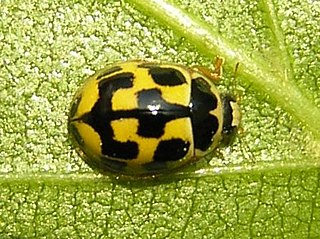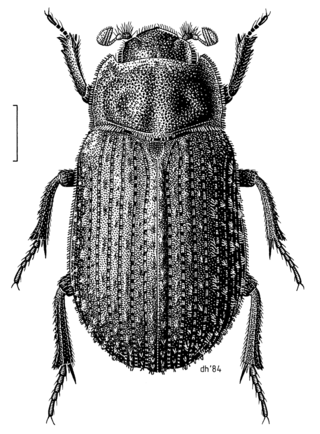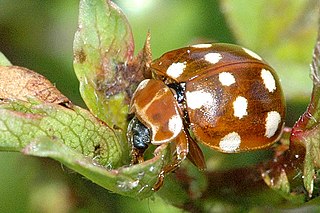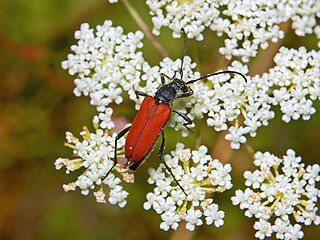
Propylea quatuordecimpunctata is a small lady beetle, belonging to the family Coccinellidae. It is sometimes referred to by the common name 14-spotted ladybird beetle, or simply P-14.

Trox scaber is a beetle of the family Trogidae. The 5 to 8 mm long insect is found worldwide, including in Europe, and lives in bird nests.

Emmelia trabealis, the spotted sulphur, is a moth of the family Noctuidae. The species was first described by Giovanni Antonio Scopoli his 1763 Entomologia Carniolica.

Valgus hemipterus is a smallish species of scarab beetle found in the Northern Hemisphere.

Adalia decempunctata, the ten-spotted ladybird or ten-spotted lady beetle, is a carnivorous beetle of the family Coccinellidae.

Calvia quatuordecimguttata, the cream-spot ladybird, is a species of ladybird in the family Coccinellidae. Its distribution is holarctic, it being found in Europe and through the East Palearctic to Japan. It is introduced to North America. This ladybird is generally 4 to 5 millimetres in length and varies in appearance depending on the geographical location. It usually lives in hedgerows and deciduous trees.

Stictoleptura rubra, the Red-brown Longhorn Beetle, is a species of beetles belonging to the family Cerambycidae.

Anastrangalia sanguinolenta is a species of flower longhorn beetles belonging to the family Cerambycidae, subfamily Lepturinae.

Asemum striatum, the black spruce borer, is a beetle species belonging to the family Cerambycidae, subfamily Spondylidinae.

Clytus rhamni is a species of round-necked longhorns belonging to the family Cerambycidae, subfamily Cerambycinae.

Pachytodes cerambyciformis is a species of beetle belonging to the family Cerambycidae, subfamily Lepturinae.

Stenurella melanura is a flower longhorn beetle species of the family Cerambycidae, subfamily Lepturinae.

Anastrangalia is a genus of beetle in the family Cerambycidae, containing the following species:
Anastrangalia montana is a species of beetle from family Cerambycidae, that could be found on Crete and Cyprus, in Greece, and in Asian countries like Syria and Turkey. The species, just like their other members of the family, have brown coloured pronotum (males), and black (females).

Anastrangalia reyi sequensi is a subspecies of beetle from the family Cerambycidae, that can be found in such Asian countries as China, Japan, Kazakhstan, and Mongolia. The species have brown pronotum.

Hippodamia notata is a species of ladybird belonging to the family Coccinellidae.

Ptosima undecimmaculata, the Splendour beetle, is a species of beetles in the family Buprestidae.

Alosterna tabacicolor is a species of beetle in family Cerambycidae.

Tillus elongatus is a species of beetle in the Family of checkered beetles Cleridae. It is found in the Palearctic. The “Holz” in the German common name Holzbuntkäfer indicates that these checkered beetles are found in wood. Although Tillus elongatus can reach up to a size of 1 cm long, the beetle is rarely seen by humans, as it primarily resides hidden in the wood of trees. The colouration of the males differs from that of the females.

Coptocephala unifasciata is a species of leaf beetle belonging to the family Chrysomelidae, subfamily Cryptocephalinae.




















